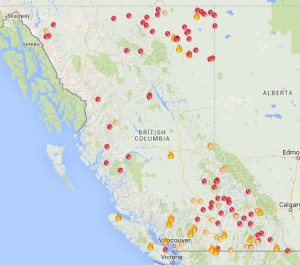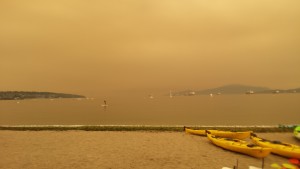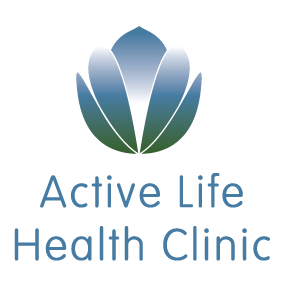 As of today in BC, there are 68 active fires of note and/or fires larger than 10 hectares (there are many more fires in total than that!). But there are actually 197 fires total active around BC! That’s huge! And unusual for us this time of year. What’s even more unusual was waking up this past Sunday morning to an eerily coloured sky caused by the haze of smoke from those fires. By Sunday afternoon in Vancouver and many surrounding areas, the smell of smoke was in the air. My husband and I had taken our bikes downtown to check out the fan activity for the FIFA Women’s World Cup, and by 3 p.m. we decided that the smoke was too much, so we headed home to watch the game there.
As of today in BC, there are 68 active fires of note and/or fires larger than 10 hectares (there are many more fires in total than that!). But there are actually 197 fires total active around BC! That’s huge! And unusual for us this time of year. What’s even more unusual was waking up this past Sunday morning to an eerily coloured sky caused by the haze of smoke from those fires. By Sunday afternoon in Vancouver and many surrounding areas, the smell of smoke was in the air. My husband and I had taken our bikes downtown to check out the fan activity for the FIFA Women’s World Cup, and by 3 p.m. we decided that the smoke was too much, so we headed home to watch the game there.

I did SUP yoga that morning, and this was the view of Kits beach as I headed out. (photo not modified)
Within a few hours the air quality advisory for Vancouver was at 7/10–in the high risk category–and we could feel it. For some it caused shortness of breath, wheezing, asthma attacks, coughing, scratchy throat, and irritated sinues. My husband experienced burning eyes. I got a headache (headaches are my barometer for pretty much anything that is not right for my body). Those with lung health issues, the elderly, and the very young are those most at risk with poor air quality advisories.
Thankfully air quality has improved in Vancouver and the Lower Mainland, though the values are still wavering between a low to moderate level (2-5). In Squamish and Whistler right now, the numbers are much worse, with Whistler at 8 right now.
You’ve likely heard the recommendations to close your windows and get inside an air conditioned building. That may be doable during the daytime, but it’s hard to do that at night if you don’t have air conditioning in your home. I know that on Sunday we debated between keeping the windows open so we could cool our place down and closing the windows so no more smoke would enter. We chose the latter. Better to be warm than risk damaging our health.
Protect Your Lungs
- Check out the air quality ratings in your area. In BC, this is the link: bcairquality.ca
- If you hear advisories about air quality in the news, listen to them.
- Minimize your exposure. Close windows and minimize outdoor activities. If you have heart or lung disease or are frail, consider leaving the area to stay somewhere with better air quality.
- Avoid burning things like wood fireplaces, gas logs, gas stoves, and even candles when smoke levels are high. Unlikely you’ll want to be lighting up your wood fireplace in this heat, but gas stoves might be more of a challenge for some.
- Don’t vacuum, as that stirs up particles already in your home. I like the excuse not to vacuum! However, some people noticed an accumulation of ash in their place. When you clean, consider using a proper particulate mask. Dust masks are not enough. An effective mask must be able to filter very small particles. Smoke particulate averages about 0.3 microns. It must also provide an airtight seal around your face. Masks marked with “R95,” “N95,” or “P95” can help (I found these online at Home Depot), but R,N, or P99 or 100 masks filter even more (Amazon has some 99 ones). Note that they won’t work if you don’t get a proper seal, and that those of you with beards will have a near impossible time to get a good seal. You might also find it’s hard to breathe through the masks, as they increase resistance to airflow.
- Use an air purifier to help filter some of the particulate out of your indoor environment.
- And, clearly, it’s better if you don’t smoke. That pollutes you and the lungs of people around you even more. Maybe it’s good timing to quit (see my blog on quitting smoking).
Support Your Lungs
- Find a clear air place to practice some deep cleansing breath work. Breathe in through your nose, fully and deeply. Hold your breath for a count of five. Then open your mouth and fully and slowly exhale all the air out of your lungs. When you think you’ve breathed it all out, use your abdominal muscles to help your diaphragm lift up further by exhaling “ha…ha…ha” to push out more air. Breathe in again, and repeat this sequence a few times. If you have chronic lung health issues, consult with a health professional before trying this. Also be careful if this makes you dizzy. Practicing this or other deep breathing exercises can help strengthen the lungs.
- Hydrate well. Your whole body needs water to function properly. Water also helps with mucus production and movement, key to collecting and getting rid of viruses, bacteria, other pathogens, toxins, and cellular waste products.
- Include garlic and onions in your diet. They help fight infections and decrease inflammation.
- Eat kale, cauliflower, broccoli, and cabbage. They are part of the cruciferous veggie category, and they are rich in antioxidants that help to manage cellular damage. They have also been shown to help prevent and fight lung cancer.
- Chomp on apples. Several studies have shown that eating two to five apples a week can reduce the risk and severity of asthma and chronic obstructive pulmonary disease. It is believed that the flavonoids in apples, especially khellin, can help open up airways.
- Get treated. If you have lung health issues–asthma, allergies, COPD, emphysema, etc.–Traditional Chinese Medicine has a variety of powerful ways to support your lung health, from acupuncture and herbs to foods and lifestyle changes.
Remember, even if you don’t have any lung health issues, your lungs are vital to your good health, so take good care of them!
